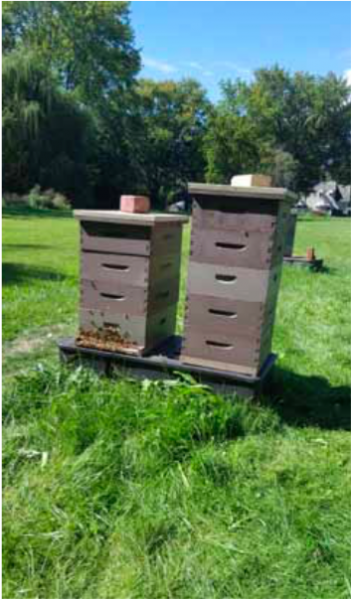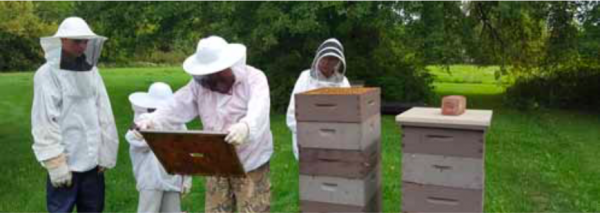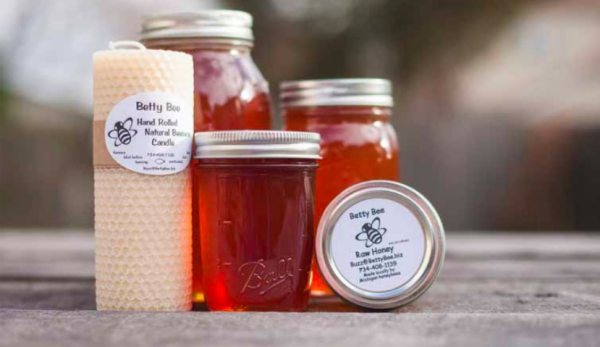 Betty Bee Apiary is a family business run by Betty and Rich Marshall, who started in the Detroit Downriver area as beekeepers 10 years ago. They raise European Apis Mellifera bees, a common species of honeybee. Betty Bee Honey is raw honey that is bottled fresh out of the hive, unheated and unprocessed. As the Marshalls led a tour of their apiary, they explained the bene ts of pure honey, the hierarchy of the bee world and their important role in our food supply:
Betty Bee Apiary is a family business run by Betty and Rich Marshall, who started in the Detroit Downriver area as beekeepers 10 years ago. They raise European Apis Mellifera bees, a common species of honeybee. Betty Bee Honey is raw honey that is bottled fresh out of the hive, unheated and unprocessed. As the Marshalls led a tour of their apiary, they explained the bene ts of pure honey, the hierarchy of the bee world and their important role in our food supply:
Raw Honey
Commercial honey packagers pasteurize their honey, which robs it of nutrients and retards the crystallization process, reducing it to a avor similar to plain, re ned sugar. Raw honey is full of natural vitamins, enzymes, powerful antioxidants and other important natural nutrients. It is an alkaline-forming food, which also has anti-in ammatory, antibacterial, antiviral and antifungal properties. It can help treat respiratory conditions such as cough, bronchitis and asthma.
As an antioxidant, raw honey can strengthen the immune system and help with digestive health. It can also normalize blood pressure and sugar levels. It has a calming effect and can be used topically to treat skin wounds for all type of infections.
Eating raw honey from a local source has also been known to be effective forrelief from seasonal allergies. Because raw honey contains a small amount of the local pollens that someone may be allergic to, eating it will teach the body to recognize the pollen and not to react to it.
Raw honey may crystallize over time. “If this occurs, simply loosen the lid and place the jar in a pot of water on the stove to warm the honey until
it is lique ed again,” says Rich. The Marshalls do not recommend heating the honey in the microwave because the heating is uneven and could damage the honey. Store raw honey in a warm or room temperature pantry and never in the refrigerator.
How Bees Work

There are three main nectars ows: spring, summer and fall. Typically, only the spring and summer honey is collected. The master beekeeper leaves the fall nectar honey for the bees to feed on during the winter.
In the beehive, there are three castes of honeybees: queens (egg- producers), workers (non-reproducing females) and drones (males with their main duty being to nd and mate witha queen). The queen lays eggs singly in cells of the comb. Larvae hatch from eggs in three to four days. They are then fed by worker bees and develop through several stages in the cells, which are capped by the worker bees when the larva pupates. Queens and drones are larger than workers, so they require larger cells to develop. A colony may typically consist of tens of thousands of bees.
Each worker bee has its own job: house bees, guard bees and mortician bees which clean the beehive, and the young nurse bees that clean the cells so the queen can lay eggs again. Nurse bees also feed the queen.
Queen bees lay about 2,000 eggs per day during the summer solstice and stop laying eggs at the winter solstice. The average lifespan of a queen is three to four years; drones usually die upon mating or are expelled from the hive before the winter. Workers may live for a few weeks in the summer or for several months in areas with an extended winter. Queen bees lay about 20 percent drones, which are slightly larger than female worker bees and do not have a stinger, so they can be held with bare hands.
Pollination

In addition to gathering nectar to produce honey, honeybees perform a vital second function—pollination. About one- third of our human diet is derived from insect-pollinated plants, and honeybees are responsible for 80 percent of this pollination.
Pollination is the fertilization of a owering plant. The process occurs when pollen is transferred from the anthers of a power to the ovules of that or another ower. As honeybees gather pollen and nectar for their survival, they pollinate a variety of fruits, vegetables, legumes and nuts. Some crops, including blueberries and cherries, are 90 percent dependent on honeybee pollination; one crop, almonds, depends entirely on the honeybee for pollination at bloom time.
Betty Bee Apiary is located in Southgate. For more information, call 734-408-1139 or visit Facebook.com/Betty-Bee-Apiary-224772864390091.


